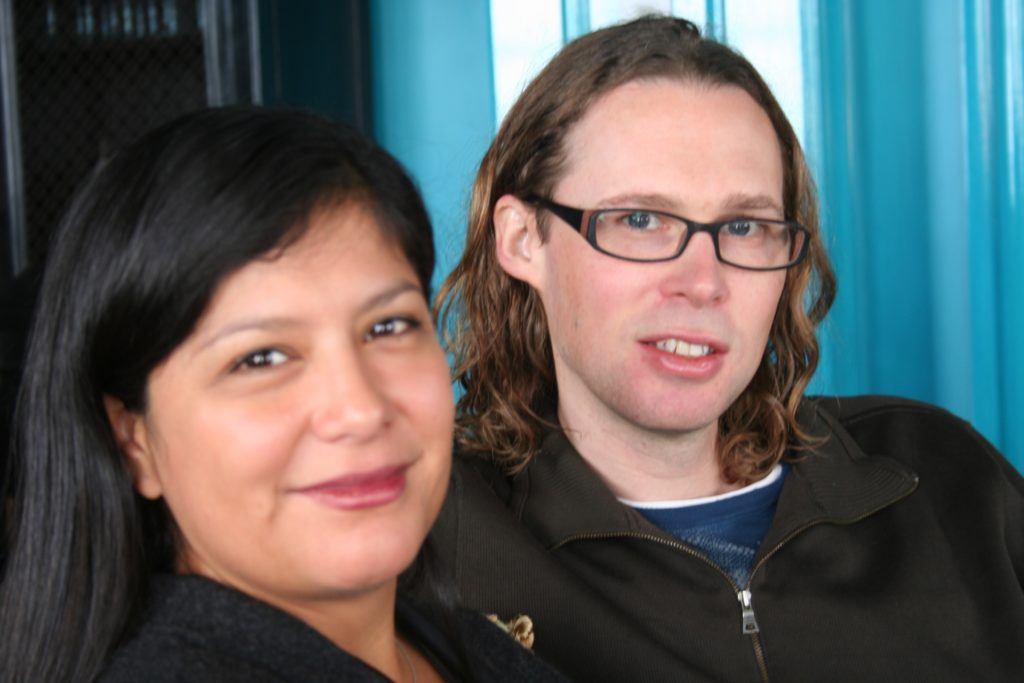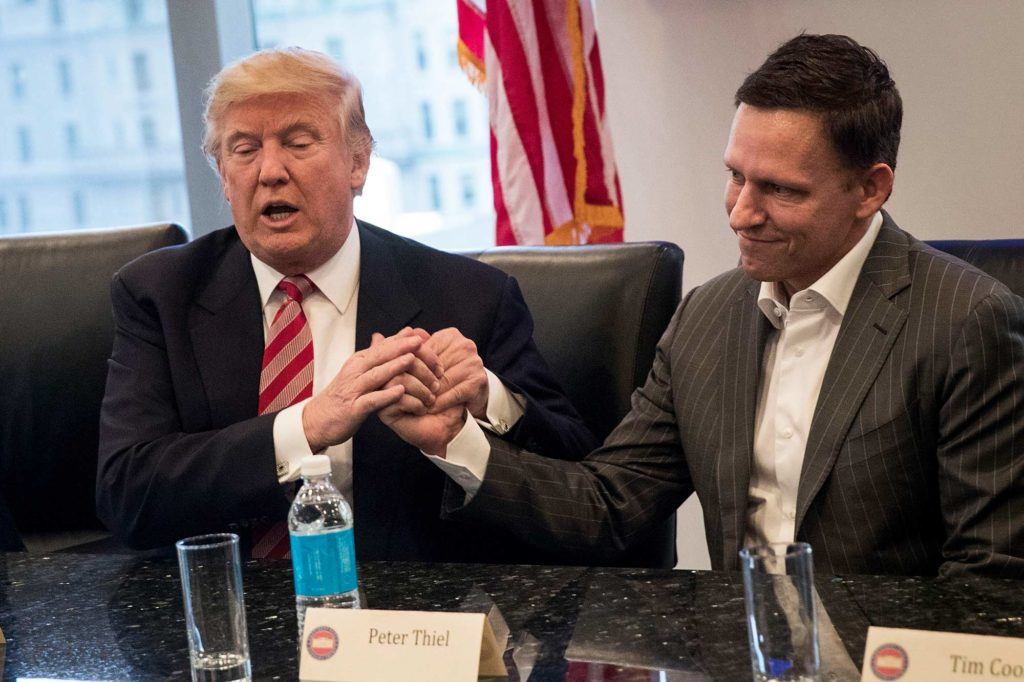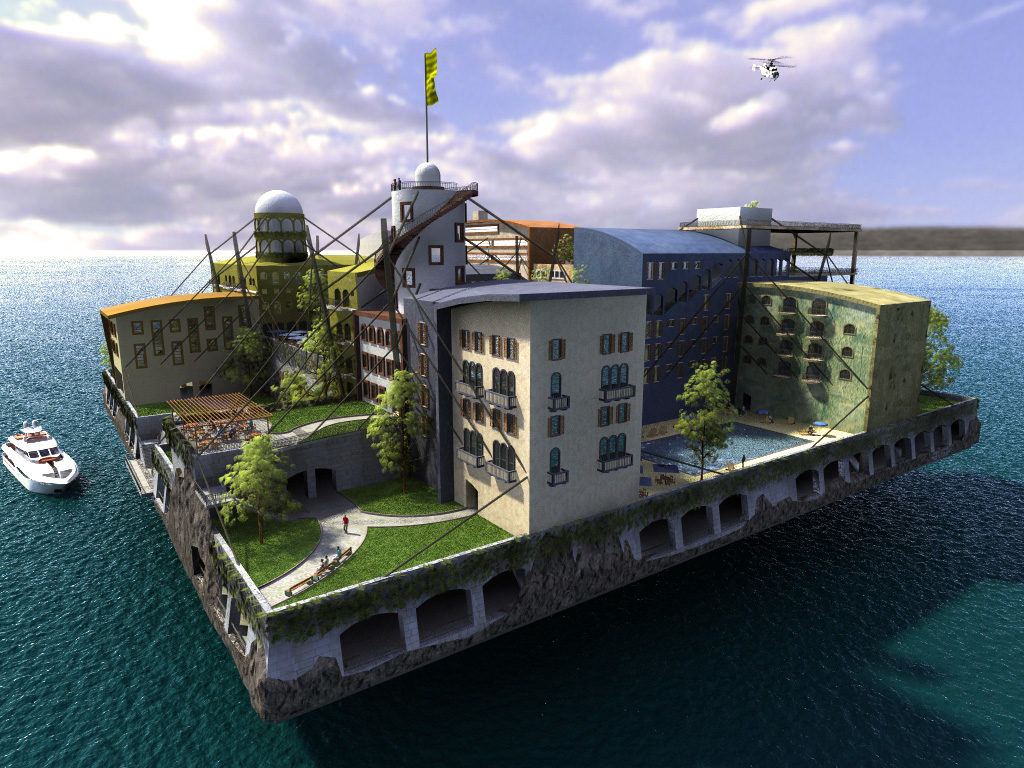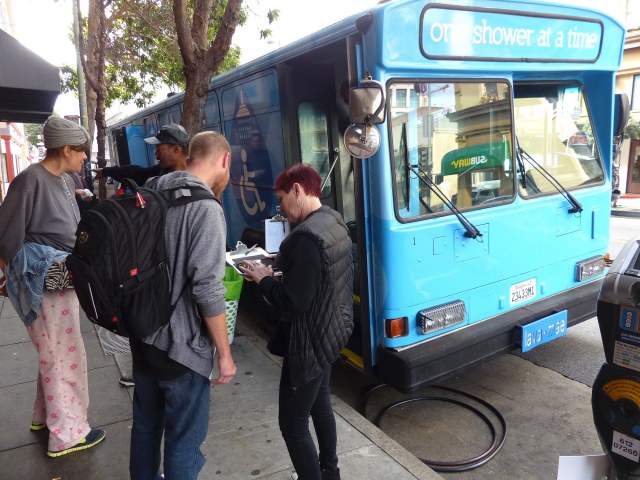These shower buses were created by a San Francisco resident who watched homelessness rise in her neighbourhood as tech came to town. Credit: Barbara Munker/dpa

On Battery Street in downtown San Francisco – a street distinguished both by its many gourmet restaurants and its homeless population – there’s an unremarkable building with dark-tinted windows called the Battery Club.[1. The Battery Club] In spite of its innocuous appearance, this club might just be ground zero of our digitally gilded age. It’s a place that captures the astonishing inequalities, incongruities and hypocrisies of life in Silicon Valley.
In the fashion of today’s digital economy, the scene outside is one of constant movement. Every minute, young people – mostly unkempt white men dressed in jeans and t-shirts but wielding the latest thousand dollar iPhones – emerge from Uber or Lyft cars.
These casually dressed young men – the alumni of Google, Facebook, Apple and other multi-billion dollar Big Tech companies – contrast dramatically with the homeless littering Battery Street’s doorways. The Battery Club members are mostly multi-millionaires and even billionaires, the masters of our new digital universe; the street people of San Francisco, in contrast, are so destitute that they don’t even own the defining accessory of our networked age – those expensive smartphones.

Where Breugel meets Gibson
Welcome to Silicon Valley, a place in which beggars and billionaires co-exist in a jarringly surreal tableaux. Part Breugel the Younger[2. Bruegel’s work can be sampled here] and part William Gibson,[3. Gibson is a contemporary Canadian-American writer, whose 1984 debut novel Neuromancer set the pace for the cyberpunk sci-fi sub-genre.] it’s a mash-up of medieval village life and 21st century apocalyptical science fiction. “The future is already here,” Gibson famously wrote in 2003. “It’s just not evenly distributed.”
And there are few places in Silicon Valley – the narrow peninsula of land squeezed between the Northern Californian metropolises of San Jose and San Francisco – that capture the future’s uneven distribution of resources than the Battery Club. Founded by Michael and Xochi Birch, a couple of Anglo-American internet entrepreneurs who sold their social media network for $850 million to AOL in 2005, their club is an exclusive, members-only establishment.
“We are fans of the village pub where everyone knows everyone,” Michael Birch explains of his seemingly modest communitarian thinking. “A private club can be the city’s replacement for a village pub, where you do, over time, get to know everyone and have a sense of emotional belonging.”
“The club offers diversity, but it isn’t about the haves and the have-nots,” adds Xochi Birch of the 58,000 square foot establishment, which boasts a 200-person domestic staff, a 23,000-pound floating steel staircase and a 3,000 bottle wine cellar. “We want diversity in every sense. I view it as us trying to curate a community.”
The truth, of course, about the Battery Club is that it only caters to the wealthiest and most connected of Silicon Valley’s new elite. Only the new plutocracy can buy the privilege of membership. Only Google, Facebook and LinkedIn alumni can afford the gourmet food and wine in Michael Birch’s “village pub”.
This hypocrisy extends all the way up and down the peninsula – from the Victorian mansions on San Francisco’s hills to the nondescript office parks on the San Jose flats. The digital revolution has been sold to us as an experiment in radical democracy. Everyone now – including, presumably, Battery Street’s army of homeless people) – would have access to the same information. We would all be empowered.
Facebook CEO Mark Zuckerberg, for example, has talked endlessly about bringing transparency, a new spirit of openness, to the world. But Zuckerberg doesn’t live up to his own utopian rhetoric. Having acquired a multi-million dollar home in a radically gentrified part of San Francisco, he also purchases the two adjoining houses. Openness is for everyone else.
Seasteading on land: a privatised world
Much has been made of Silicon Valley’s libertarian ideology, represented most controversially by Peter Thiel – the Donald Trump supporting billionaire who was the first outside investor in Facebook. The notoriously rightwing Thiel also invested in the Seasteading Institute,[4. More on the Seasteading Institute here] a libertarian project to politically replicate the disruptive Silicon Valley economy by building completely new communities off the Northern Californian coast.

But the truth about this stateless utopia is that there’s no need to build anything off the Californian coast. Thiel’s libertarian fantasy, you see, has already taken root on land. What we are seeing is the construction of a beta version of a privatised 21st century world, which is being grafted onto the analog realities of 20th century public life.
The network is replacing the state in this Silicon Valley utopia. A radically privatised socio-economic reality is being superimposed on top of public social services and products. So, for example, companies like Google and Facebook operate their own commuter network, whisking their programmers and salespeople up and down the peninsula in luxury corporate buses – mobile versions of the Battery Club. Silicon Valley is establishing its own privatised housing system, fuelled by the room sharing network Airbnb, which is driving up real estate prices so radically as to drive out those with the bad fortune to work outside the Silicon Valley ecosystem. And then, of course, there’s Uber and Lyft and the other privatised ridesharing companies, which are superimposing a “sharing” transport network on the traditional taxi system.

The Silicon Valley landscape literally even looks like al mash-up of feudalism and 21st century science fiction. Zuckerberg has commissioned Frank Gehry to build a new Facebook headquarters in Menlo Park, an exclusive suburb in Silicon Valley’s heart. It’s been designed as a mock village with coffee shops, ice cream stores and bicycle repair stations, plus four hectares of wifi powered wildflower meadows.
But it’s only Facebook employees, of course, who have access to this idealised community – an unintended parody of Marshall McLuhan’s “global village”. (5) Outside this exclusive campus, the underclass of Silicon Valley struggle to survive. In neighboring East Palo Alto, for example, half of school-aged kids are homeless. So all of Silicon Valley is, in reality, an extension of San Francisco’s Battery Street – with its bizarre coexistence of billionaires and beggars.
The apotheosis of this spectacle is the new $5 billion Apple headquarters in Cupertino. Designed to resemble a spaceship, the 2.8 million square-foot circular building looks as if some Martian vessel has touched down on earth.
And, in a sense, it has. An alien practice of perpetual disruption is transforming this region of northern California. Silicon Valley is the Battery Club, amplified. The invaders are the new reality, and they’re spreading.










Join the discussion
Join like minded readers that support our journalism by becoming a paid subscriber
To join the discussion in the comments, become a paid subscriber.
Join like minded readers that support our journalism, read unlimited articles and enjoy other subscriber-only benefits.
Subscribe